#lok analysis
Text
Beifong headcanon:
Suyin knew that Toph had retired to the swamp (and possibly even visited her from time to time) but promised not to tell anyone her location. However, she told Lin once they reconciled. Opal also knew she was alive, but not exactly where.
My reasoning for this is the mild reaction Lin and Opal had to Toph randomly showing up, as well as Lin's line, "You know, after Su and I patched things up, I thought, 'Maybe I should reach out to Mom'." Why would she say that if she didn't a) know she was alive and b) had some idea of where to find her?
I like this explanation much better than what some people assume, which is that Toph abandoned everyone and made them think she was dead. I don't really understand why people want to think the worst of her. She had flaws but still had a big heart. I think she just got to a point where seismic sense made it too hard for her to live around other people.
#lok#legend of korra#lok analysis#beifongs#headcanon#lin beifong#suyin beifong#toph#toph beifong#opal beifong
60 notes
·
View notes
Text
Hi just a reminder, Mako’s character development was NOT a “redemption arc”. He was never bad to begin with.
I see a LOT of people mischaracterizing Mako as being the main instigator for a lot of the problems regarding that whole stupid love triangle or people calling him a “player” or whatever.
Did he make the best decisions in that situation? No, of course not, but really none of them did. I’m tired of people leaping to defend Korra and Asami for that whole thing while targeting Mako negatively.
This isn’t to say I don’t like Korra and Asami, I love them and I want to marry them. But none of the characters were great in that, and not to mention that scenario is only a part of Mako’s character. Korra and Asami were his first friendships/relationships in life. The only real other interaction he got from someone around his age was his brother.
So OF COURSE he’s not going to be perfect in that. And the same stands for Korra and Asami! Now, I’m not excusing what they did. Both kissing Mako without his consent was not okay, and the scene where Korra physically harasses Mako at his workplace will never sit right with me, and Mako should have been more honest, open and communicative with both the girls.
But let’s not chalk Mako up to all that. Let’s not let bias get in the way of seeing what’s truly great about his character. If you take less interest in the love triangle like me, and look past that mess, you can see Mako really is a good and likeable character, even in Season 1. He’s loyal (yes, he’s LOYAL. Argue with me about it if you want, but that’s just the definitive answer of what he is), he’s caring, passionate, driven, and most of all he loves his friends and family a LOT.
He is so much more than what a lot of the fans make him out to be. So please, whether you love Mako like me or dislike him, I implore you to contemplate on the true substance of his character and reflect on why you or other people are hating on an awkward teenager for being bad at relationships, when he’s done so much more good for himself and others.
Rant over, please appreciate Mako <3


Bye
#lok#tlok#mako#mako lok#mako tlok#tlok mako#mako and bolin#the krew#the legend of korra#korra lok#korra#asami lok#asami sato#asami tlok#asami#bolin#bolin tlok#bolin lok#lok analysis#tlok analysis#mako defense squad#legend of korra#avatar korra#avatar
225 notes
·
View notes
Text
yesterday I was explaining the intricacies of lok to my friend who has only seen atla, and he (like the rest of us) just couldn’t get over the fact that they made toph a cop. he was trying to figure out what about toph’s personality (you know, considering that it’s entirely antithetical to becoming someone who acts as an agent of the state to enforce systemic violence) would lead the writers to this conclusion. and it occurred to me that I do think many people, even those who vehemently denounce toph’s copness, do sort of assume that toph loves violence for the sake of violence. she is introduced as saying “I love fighting, and im really really good at it,” and she is shown committing various acts of violence against others (including her friends) with a grin on her face. but I still wouldn’t characterize toph as someone who employs violence for violence’s sake.
toph is, externally, defined by her limits. she is small, she is blind, she is young, she is a girl; she was raised to be soft and delicate and helpless. toph’s first true expression of freedom is when she learns to use her disability as a boon and uses her earthbending not as a weapon, but as an extension of herself. to toph, earthbending is a form of self-expression. it is an artform. I think people tend to forget that when toph says that she loves fighting, she’s not just saying that she loves the thrill of beating arrogant, gigantic, muscled men thrice her size (although of course there is also that), but she’s also saying that she loves practicing a martial art for artistry’s sake.
unlike the boulder, who only listens to his big muscles, toph waits, listens, innovates, creates, hones her craft. and while her earthbending is indeed a martial art, it is also a site of innovation, a visual art, and most importantly, a disability aid. the earth is an extension of herself; it is her artistic medium. yes, of course toph does love being able to exert power over others as a ragefilled tiny twelve year old blind girl who has been denied agency her entire life, but power is not her primary motivation when honing her earthbending. she cares about craft, about innovation, about being one with the earth. unlike all the other earth rumblers and dai li agents and earth kingdom soldiers, toph is a deliberate, thoughtful, considerate earthbender. fighting is an art, and toph is an artist.
#people really love reducing toph which is kind of ironic considering that toph’s entire struggle is not to not be reduced and limited#alas.#toph#analysis#she’s a genius <3333333#lok crit#(technically)#hang on im gonna make another post abt asami later as well
1K notes
·
View notes
Text
"zukos character arc is best-
"no aangs flirting skills are-"
"You forgot sokkas hair-"
YALL FORGOT KORRA
SHE WENT FROM THIS
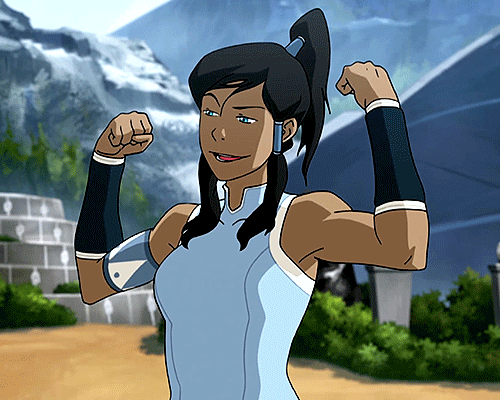
TO THIS

AND STILL GIRLBOSSED HER WYA THROUGH EVERYTHING WHILE ALSO FINDING LOVE AND GAINING BACK THAT MUSCLE!
she also showed a lot of people, like me, that mental health recovery isn't linear. like, girl, that show has problems BUT DAMN IT IF IT ISNT BETTER THAN MoST THINGS YOU SEE
#lok#avatar korra#avatar legend of korra#legend of korra#korra#korra analysis#guys we take advantage of the fact that she comes from an amazing fandom#like she is such a good character#and a great show#and yall trash on it#(im not saying it shouldn’t take criticism)#yall need to chill with the korra hate#you're probably jealous you can pull an asami
430 notes
·
View notes
Text
Katara's Legacy in LOK: "Healer Wife of the Avatar" (part I)
I only recently finished watching all of The Legend of Korra from start to finish. Based on the analyses I’ve read from the time the show was airing, there seemed to be a decent amount of backlash against how the adult gaang was portrayed - particularly Katara. LOK’s fanbase has grown since then, though, especially during the 2020 renaissance, and I was surprised by how many recent positive comments I’ve seen from fans on Katara’s role.
Because if you paid attention at all to Katara’s characterization compared to Aang, Sokka, Toph, and Zuko, it’s clear just how much Legend of Korra has tarnished her “legacy” or lack thereof.
I will be splitting this analysis of lok!Katara into two parts:
First, I will break down her portrayal in the show compared to the other members of the gaang to demonstrate how Katara received the worst treatment from the writers. Though I did have problems with the other characters’ portrayals as well, I don't have time to discuss them in-depth in this post. Then, I will counter common arguments used in defense of lok!Katara’s portrayal on the grounds that they do not provide an adequate in-universe explanation for her character’s drastic change from ATLA.
For part 1, I decided to examine everything we know about the gaang after the original series only based on the information provided via Legend of Korra (excluding poor Suki, who is never mentioned at all). For each character, I will answer the question “What do we know about [character] based solely on their role in Legend of Korra?”
Sokka

Assuming we have never watched ATLA before, what do we know about Sokka based on LOK?
Well-respected for his wisdom and leadership, as he was Chief of the Southern Water Tribe, a councilman in Republic City (Representative of the Southern Water Tribe), and the chairman of the United Republic Council
Played a significant role in Yakone’s bloodbending trial - moderated the Council’s deliberations and announced their decision to find Yakone guilty
Worked together with other political/military leaders - Zuko, Tenzin, and Tonraq - to protect Avatar Korra by designing prisons for Red Lotus members that would be impervious to their bending
Toph mentioned they were friends in their youth, describing a time he was stuck in a hole when she was trying to teach Aang earthbending
Sokka, Toph, and Aang seemed to have remained friends into adulthood as they all worked together to defeat Yakone
Fond of his trusty boomerang, which he claimed to have used to win a fight against a man with combustion abilities
Due to his achievements, has a statue built in his honor in front of the Southern Water Tribe Cultural Center in Republic City
Zuko
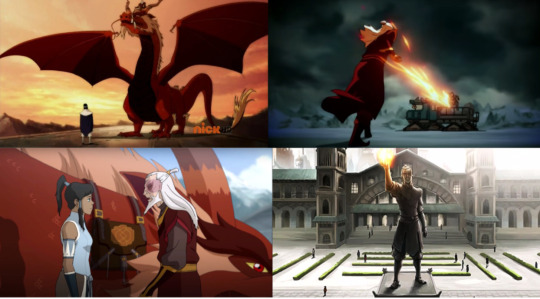
Assuming we have never watched ATLA before, what do we know about Zuko based on LOK?
Former Fire Lord and co-founder of the United Republic, who worked with Avatar Aang after the 100 years war to transform the Fire Nation colonies into the United Republic of Nations
Zuko and Avatar Aang had a rocky start, as Zuko described a time when he once hired a man with combustion abilities to kill Aang in his youth, but they eventually became close friends
Acted as Aang’s counsel and was described as being the person who knew Aang better than everyone else, leading Korra to turn to him for advice
Good friends with the Southern Water Tribe - worked with Sokka, Tonraq, and Tenzin to imprison Red Lotus members that wanted to kidnap Korra, specifically working with Unalaq and Tonraq to build a prison to hold P’Li
Years later, continued to work against the Red Lotus when they broke out of prison
Investigated the prison break of Ming-Hua, sent word to Lin Beifong to protect Korra, then flew off on his dragon to stop the Red Lotus from breaking P’Li out of prison
Fought Ghazan using his firebending during the Red Lotus break-in
Discussed the Red Lotus situation with Lin, Korra, and the others, before leaving early on Druk (his dragon) to return to the Fire Nation and protect his family
Despite being in “retirement,” remains an active participant in international relations - makes appearances as Prince Wu’s coronation and Jinora’s airbending master ceremony, along with engaging in discussions with President Raiko, Tenzin, and Tonraq about the future of the Red Lotus after Zaheer was imprisoned again
Highly respected and honored for his achievements - Bolin and Mako were impressed to meet him, statue was built in his honor in Republic City
Had a close relationship with his Uncle and his surviving family include his daughter, Fire Lord Izumi, and his grandson, General Iroh II
Toph
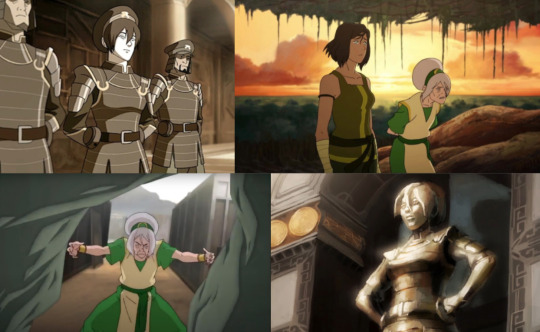
Assuming we have never watched ATLA before, what do we know about Toph based on LOK?
Previous Chief of Police in Republic City, founder of the first metalbending police force, founder of the first metalbending academy
Renowned for inventing metalbending, which is utilized for the development of modern technology and innovation in Republic City and the Earth Kingdom (particularly, Zaofu, is regarded as the safest city in the world due to it being made entirely out of metal)
To honor her metalbending achievements, there are several statues of her in Zaofu
Good friends with Avatar Aang, whom she affectionately named Twinkletoes, and was his earthbending teacher
Worked with Aang to arrest Yakone and was present at Yakone’s trial
Acted as a mentor to Korra, helping Korra face her fears and trained with her
Despite her old age and grumpy personality, Toph remained a strong fighter - easily able to beat Korra during training sessions, take down Kuvira’s sentries, and successfully break into Kuvira’s prison using her earthbending and metalbending abilities
States that her fighting days are over due to her old age, but has no problem fighting to save her family when they are captured by Kuvira (twice)
No interest in involving herself in current political problems in the Earth Kingdom, but will defend her family from political forces that threaten them
Strained relationship with her daughters (Suyin and Lin) because of how busy she was with her job, giving them too much freedom as she didn’t want to be as strict as her own parents
Covered up for Suyin’s crimes to save her reputation, leading her to retire early from guilt
Eventually repairs her relationship with her daughters - admitting she wasn’t a great mother but had great kids
Spent rest of her life living alone in a swamp, mentioning she has previous experiences with the visions it produces
High reputation in Republic City - has a statue of her built in front of police headquarters, Asami is impressed by her, Bolin calls her his hero
Aang
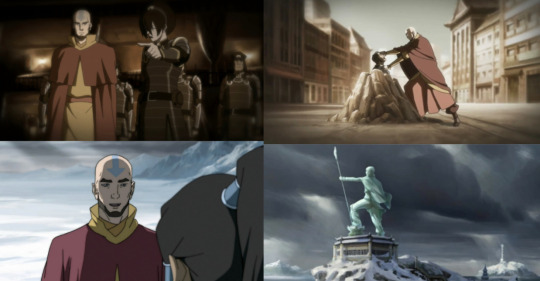
Assuming we have never watched ATLA before, what do we know about Aang based on LOK?
Previous Avatar before Korra, negotiated relations between people of all nations to keep peace and balance and served as the bridge between the Spirit World and natural world
Worked with his closest friend Zuko to transform the Fire Nation Colonies into the United Republic of Nations after the war
Lost his entire culture of Air Nomads to genocide during the hundred year war and was devastated - his greatest dream was frequently described as rebuilding the Air Nation and reviving Air Nomad culture
He began to do this by founding the Air Acolytes, who preserved the culture, practices, and teachings of the Air Nomads passed on from Aang
Placed all of his hopes and dreams for the future on Tenzin's shoulders, his only airbender son
Deeply connected to the Spirit World and was an esteemed spiritual leader, hoping his son would one day experience the same
Traveled the world with Tenzin so he could learn as much as possible, but was so focused on doing his duty to the world that he never had time for his other kids, Kya and Bumi, whom he had with his wife, Katara
Kya and Bumi felt like a disappointment to their father for not being airbenders and Bumi never felt connected to his father’s culture until he became an airbender later in life
Aang’s acolytes did not even know Aang had other children besides Tenzin
All of this seems to indicate Aang valued the ability to airbend the most in his children, leading to his waterbending/nonbending kids being neglected
Greatest flaw mentioned as his tendency to cut and run when things get tough
Despite all this, he was highly respected and admired by most characters in the show for all his achievements as Avatar and his wisdom
Assisted in the arrest of Yakone with Toph, a friend of his, and used energybending to remove Yakone’s bending
Gave Korra advice along with restoring her bending and bestowed upon her the ability to energybend
His grandkids (Meelo, Jinora, and Ikki) enjoyed hearing stories about his youth, such as his visit to Wan Shi Tong’s spirit library and his time with Guru Pathik at the Eastern Air Temple
Described as natural leader by Tenzin, sweet-tempered by Lin, and was good friends with Iroh
He built the air temple on Air Temple Island and in his honor, Aang Memorial Island was named after him and a statue of him was built
He’s so well-known and respected that there are even Aang-themed carnival games at the South Pole
Katara
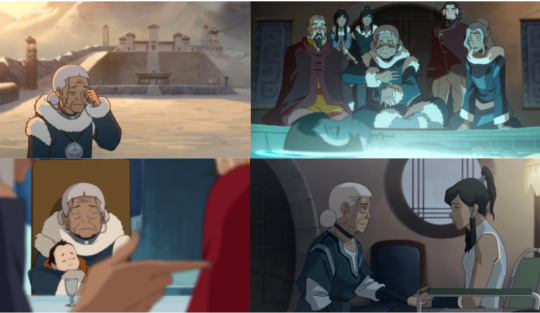
Assuming we have never watched ATLA before, what do we know about Katara based on LOK?
Described as the best healer in the world, responsible for teaching Korra how to heal, and mentioned to be a waterbending master
Monitored Korra’s avatar training and spoke to the Order of the White Lotus when Korra was ready to begin airbending training
Declared bloodbending illegal, but was not present for Yakone’s capture or trial
Attempted to restore Korra’s bending after Amon took it, but failed
Failed to heal Jinora when she was trapped in the Spirit World
Tries to guide Korra’s healing process after she is poisoned, but is unable to heal her on her own
Worked to heal the injured after Unalaq’s attack
According to Toph, Katara didn’t get involved in the civil war taking place in her homeland because of her old age
Mentions to Korra she knows what it’s like to go through a traumatic experience but doesn’t elaborate, instead describing Aang’s trauma
Married to Avatar Aang and had three kids - Tenzin, Kya, and Bumi - and three grandchildren - Ikki, Jinora, and Meelo
After Aang and her brother died, she was incredibly lonely, prompting Kya to move to the south pole to be with her. Misses her family that has passed away.
Her kids don’t visit her much, Meelo doesn’t even recognize his grandmother. She cries when Tenzin and his family leave.
Never speaks about her own life, but Jinora asks her once about what happened to Zuko’s mom, indicating they may have known each other.
By reading those summaries, it should be obvious just how differently Katara’s character was treated by the writers compared to the others. Katara’s legacy is reduced to simply being the “healer wife of the Avatar.”
And before anyone tries to twist my words: The problem is not that she is a mother, a wife, and a healer. The problem that is all she is ever allowed to be. Her entire identity revolves around:
Trying to heal people
Being the Avatar’s wife and occasionally offering random pieces of advice about what Aang would do (instead of, you know, giving advice based on her own experiences)
Missing her family
Again, none of these characteristics are inherently negative - the problem is how poorly they are written for Katara’s character. We are told things about her that just don't match up with what is shown in LOK canon. We're told that she’s a world renowned healer, but every time we see her use these abilities, she fails. We’re told that she’s the Avatar’s wife, but he was closest to his friend, Zuko. We’re told that she’s a mother who cares about her family, but we don’t know anything about her relationship with her children (and in fact, we know far more about her children's relationship with Aang).
Katara has no characteristics, no personality outside of her relationship to others - whether she’s acting as a healer, a mother, or a wife (this is some textbook misogynistic writing). She never speaks about herself, never mentions having any friends - only ever speaking about her husband, never describes her life before being a mother or a wife, is never shown to be honored or respected in the way the rest of the gaang is, has no political titles, and has only one post-atla accomplishment to her name. This is in contrast to Aang, Zuko, and Toph - all of whom have children but are never reduced solely to being a parent, all of whom are implied to be close friends, and all of whom have made multiple important contributions to the world of LOK. Even Sokka - who is barely in the show - is shown as having more achievements than Katara. I’m not sure how anyone could see this as doing Katara’s character justice.
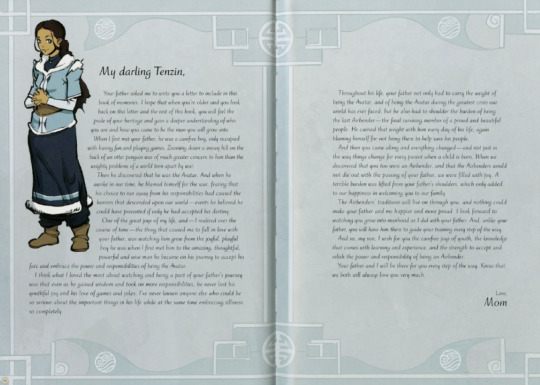
I want to end with this excerpt from the book Avatar: The Last Airbender: Legacy - while not from Legend of Korra, this letter written by Katara to her and Aang's son, Tenzin, is a perfect demonstration of Katara's poor characterization post-ATLA. Despite being written by Katara, this entire letter is about Aang. I'm honestly not sure why the writers didn't just have this letter written by Aang himself because there are no insights that Katara adds to it.
The letter starts with Katara saying that she hopes this letter will help Tenzin "feel the pride of [his] heritage and gain a deeper understanding of who [he is]." And yet this letter never discusses the fact that Tenzin is the son of a waterbender and an airbender, never discusses any of the lessons Katara has learned in her life or the hardships she's overcome, never mentions any part of water tribe culture, never even mentions her own brother or father or mother (family is important to Katara, but apparently the writers only think that her family with Aang matters). The letter is entirely about Aang's struggles and triumphs because post-ATLA Katara doesn't matter outside of her relationship to her husband and kids.
Part 2
#katara#katara analysis#atla#zutara#anti lok#lok critical#this is not shipping related at all but tagging zutara for visibility#pls show up in the tags tumblr i don't want to repost this a third time#my post#my meta
218 notes
·
View notes
Text
⚣ ATLA/LOK: The Four Nations & Homosexuality ☀️
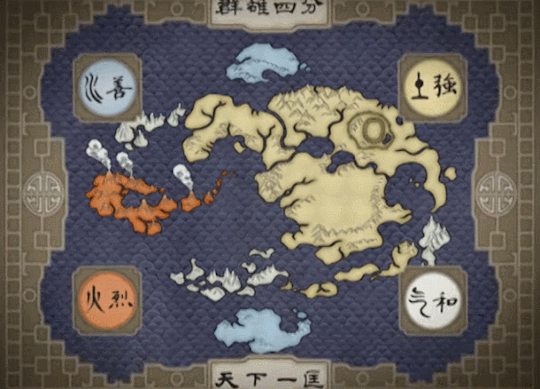
I'm planning to write for my favorite characters from the Avatar universe again. Any OGs from my first account know I started posting content about ATLA and LOK, specifically Bolin and Mako, WAAAY before I started posting DC and Marvel content among others.
So I wanted to talk about something I found really interesting about homosexuality within the four nations and their attitudes towards it regarding acceptance and whether they embraced or turned away from it. And since we are soon getting a new Earth Avatar series, we might as well start with the Earth Kingdom.
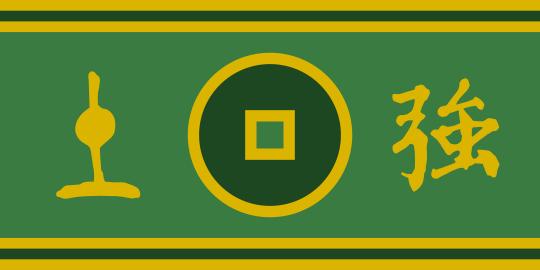
EARTH KINGDOM
First, let's consider the element of the nation itself and what it symbolizes.
Earth is not just the element of strength, but also the element of endurance and rigidity. In simple terms, it's a tough and stubborn element.
Also, Earth is a hybrid element, meaning it can be used in defensive and offensive manners easily.
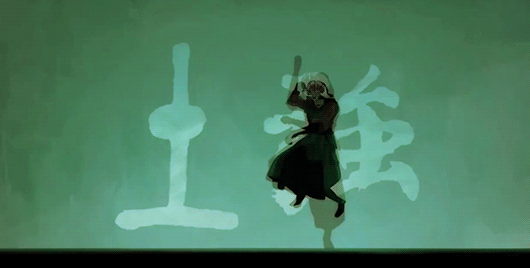
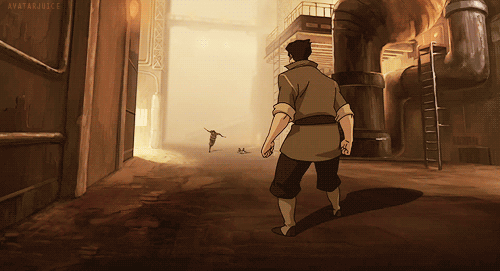
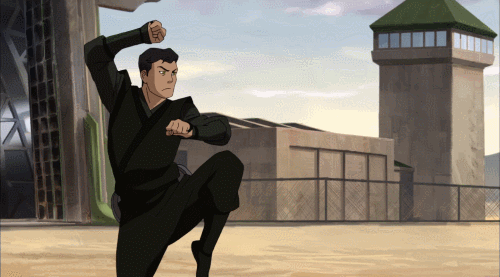

Concerning its nation, it can be shown how citizens of the Earth Kingdom would more than likely be very conservative and adverse to any change or diverting from societal standards in the norm.
They're stubborn and stuck in their ways, so they may not react the most positively to displays of affection between same-sex couples. But, it can work in both ways.
As mentioned, Earth-benders and citizens, in general, tend to be very stuck in their beliefs, meaning if one were to have a more liberal position on the matter of social and romantic relationships, they would be just as defensive and stubborn in that belief as someone more conservative and traditional.
This goes back to my saying that Earth itself is a hybrid element. A mix of defensive and offensive tactics. Just as much as people way attempt to push their beliefs onto others, they're just as quick to defend their beliefs and ideals.
I'd also argue region/location within the Earth Kingdom is a major factor. If we're talking places like small villages or cities like Omashu in the animated version, you may be met with pushback and intolerance. But, places like Kyoshi Island where its founder was a lesbian so likely had very liberal beliefs concerning such topics. Also Omashu from the live-action since that version portrays Oma & Shu as a lesbian couple, and even Ba Sing Se since big cities are proven to attract a more liberal-leaning population.
But, interestingly enough, in the comics, it's stated that the Earth Kingdom is the slowest to accept change, and their default is still heterosexuality. Obviously, this comes from the rigidness and stubbornness of the Earth element itself. So even if Ba Sing Se has a more 'liberal' or rather "diverse" crowd, doesn't mean that crowd is automatically open to homosexuality. Ideally, the only known place in the Earth Kingdom where you could experience the most acceptance and grace from others would be Kyoshi Island
In summary, on a scale of 1 to 10, 10 being the most accepting & embracing of homosexual relationships and 1 being the opposite, I originally was going to give the Earth Kingdom a 5, but remembering how it's stated in the comics that they are the slowest to accept change which checks out, they got bumped down to a 2.
It is a very big nation and thus has the potential to plant different seeds of belief and opinion, however, it's clear in the show how rigid and otherwise, unshakeable denizens of the Earth Kingdom can be. They have their beliefs, and they strongly stick to them.
Even with someone like Avatar Kyoshi who had to go and make a whole separate Island where she and her people could live in peace and prosperity without certain influences affecting them, they still have yet to come around to the idea that other people live with different interests and beliefs, and that there is truly no 'default' for even one person.
Acceptance Rating: 2/10
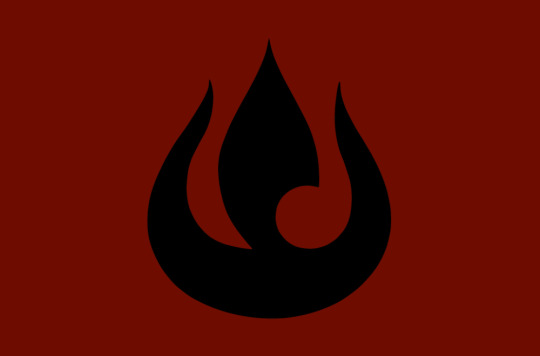
FIRE NATION
Starting with a focus on the element itself again, fire is the element of power, as described by Iroh. It can burn things in its path, but can also give life. In simple terms, it's an element of strong will and desire to expand and consume, literally and metaphorically.
Fire is also mainly an offensive element, with the capability of modifying certain offensive moves into defensive ones.
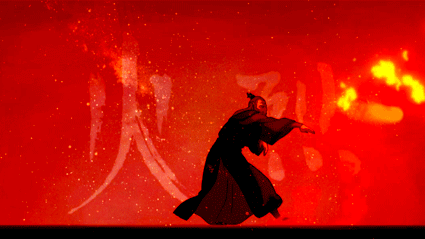
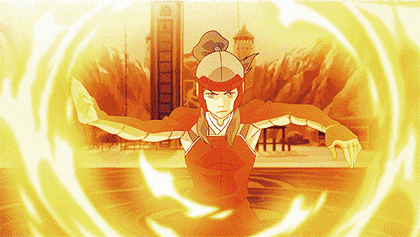
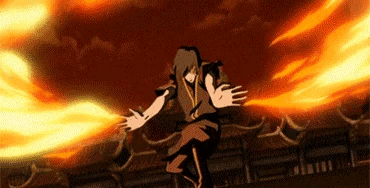
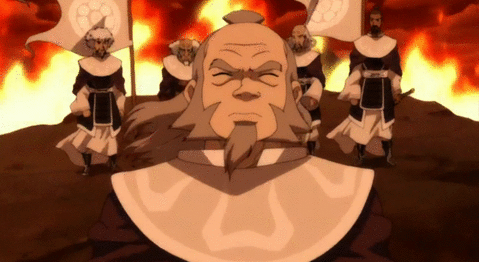
Its nation's citizens and benders heavily share these traits with their element. They tend to be willful and proud, and while that doesn't necessarily equal being close-minded, pride can very well lead to stubbornness.
This is evidenced strongly by the political government of the Fire Nation, with its monarchy power having complete and total influence and control over its citizen's lifestyles and choices. If one Fire Lord feels strongly about something and makes it into law, another Fire Lord can come two generations later and reverse and change it.
This is shown in the nation's history, where homosexuality was actually tolerated (I hate using that word) in the Fire Nation for a long time before Fire Daddy, ahem, I mean Fire Lord Sozin's rule. It was during his reign as Fire Lord that Sozin outlawed same-sex relationships and marriages among the Fire Nation and its citizens.
Some speculate it was due to the clear pressure he faced being the sole heir to the throne since his sister was born a non-bender, something that was frowned upon in the royal family. A potential heir to the Fire throne had to be a firebender, with no exceptions. Therefore, Princess Zeisan was allowed more freedom and control in her life than he was, as evidenced by her embracing Air Nomad culture and being confirmed as a lesbian.
It was common knowledge that Sozin and Zeisan had a very antagonistic and tense relationship with each other, despite them being siblings. They were pitted against each other from a young age which caused a rivalry between them. So, it's completely possible to speculate that Sozin implemented the law to spite his sister who fell in love with Sister Rioshon, an Air Nun.
it's also completely possible to theorize that Sozin harbored homosexual tendencies and feelings himself, especially towards his best friend, Roku we all know was the Fire Avatar before Aang. Again, his being a royal prince and next in line for the throne threw a wrench in this since Sozin was expected to marry a woman and produce an heir. So his potential feelings for his best friend could never be explored due to his duties and responsibilities to his nation.
So since Sozin couldn't have what or who he truly wanted, no one could, and thus, same-sex love and marriage were banned. And that didn't change no matter where you went in the nation unlike the Earth Kingdom where you could go from village to village and city to city and the rules would be completely different depending on where you were.
Again, fire is the element of power and will. And if it was the will of the Fire Lord to ban same-sex relationships in the nation entirely, then everyone had to fall in line. Meaning the door was opened for more conservative and traditionalist views to be voiced in opposition to same-sex relationships.
While some may have had differing beliefs and ideals, they more than likely had to keep it to themselves, especially among the nobility. This can lead to harboring feelings of anger and resentment, rather than love and acceptance, causing people to react harshly to any displays of such affection and behavior, just like Sozin.
As I said, fire as an element itself is primarily offensive in nature. Reflecting on its people, and especially its governing body, this is clearly shown by the notion that one person's opinion and belief can be pushed onto everyone around him if he or she so decrees it.
With that, the Fire Nation gets a 3/10 on the scale. Again, in the past, they were at minimum tolerant of it. which is not much if we're being honest. Tolerant actually is kind of insulting. But, after Sozin's rule, that tolerance more than likely dwindled and hasn't improved much following his reign as far as we know.
I'd like to think that Zuko as the Fire Lord, having seen much of the world and all its different dimensions and lifestyles people have lived, he'd at some point in his reign reverse the ruling, but that's a far-fetched hope knowing these writers and creators (no shade...mostly).
Acceptance Rating: 3/10
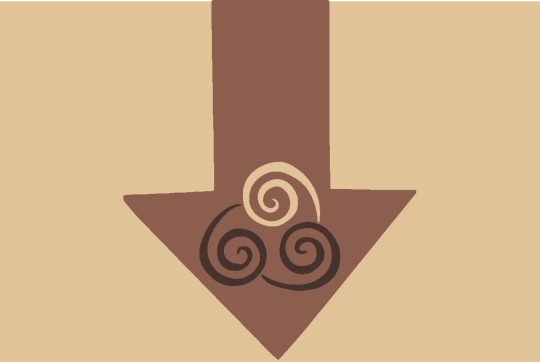
AIR NOMADS
Air is the element of freedom. It's flexible and lacks restriction, moving in any direction it desires. And because of its lack of constraint, it becomes easily adaptable in any scenario, whether it's evasion, offense, defense, etc.
However, the element of air is primarily and almost purely used as a defensive and evasive practice among its population, due to its nation as a whole choosing to live as pacifists. But, do not be misled. As mentioned, air as an element can be just as powerful offensively as it is defense-wise.
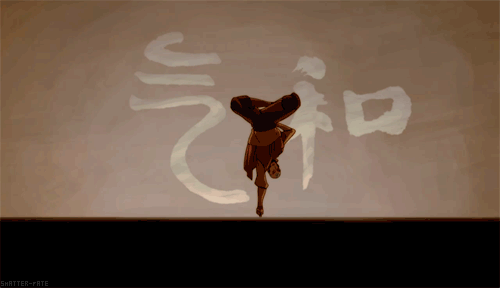

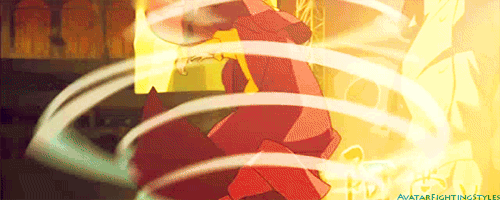
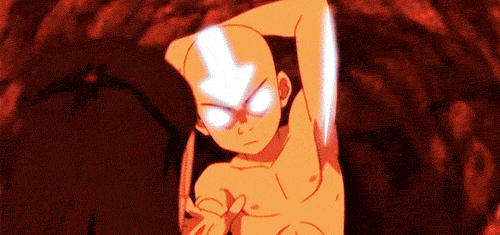
Just as their element, the benders of the Air Temples were very open and flexible people. As monks and nomads, they chose to forego many earthly and physical connections, seeking spiritual enlightenment. Because of this, there were never any non-benders in the Air Nomads.
Any child born from an Airbender was an Airbender themselves. Also, due to their style of life and spirituality, they were very adaptive to any situation they were placed in, making them very open to any and all change around them.
While they lived by the teachings of the monks and masters of the Air Nomads, they lived freely and openly, just like their element. The most restriction they had was as children or masters/monks that lived at the temples, males and females were not allowed to live together in the same space.
I'm not sure if this applies to temples as a whole as I've seen conflicting information. Some say the rule applies to temples as a whole, which would mean the Northern and Southern Temples were only inhabited by male Airbenders, and the respecting Eastern and Western temples were inhabited by female Airbenders.
But, I do remember a specific scene from Avatar, during the 2nd season when Appa was lost, and he had a memory of when he was a baby bison, and he and Aang met for the first time. I remember the monk facilitating this was a female Airbender, so that's why I'm not exactly sure what is concrete.
But, it does make sense as in many of Aang's flashbacks to his time at the Southern Air Temple, we mainly only ever saw male Airbenders. Thus, many have speculated that this specific rule would inadvertently encourage exploration and curiosity for these young Airbenders regarding their sexuality as they matured and eventually left the temples as adults and master Airbenders.
Also, on this, no child from the Air Temples was raised by their parents. They were only raised by the monks, enforcing that common belief and practice they all had. While they of course had their own identities, they were all taught the same thing from an early age, if an Adult Airbender met and had a child with someone from a different nation, that child likely being an Airbender would be sent to the Air temples to be raised by the monks.
All that to say, Airbenders would be the exact opposite of conservative. They technically wouldn't even be liberal since, again, they detach themselves from earthly limitations in favor of a higher spirituality.
So, since they don't subscribe to earthly practices or beliefs, they would be the most accepting nation of homosexuality and same-sex relationships. It's not in their nature or belief to judge others either so they wouldn't show any hostility or intolerance to LGBTQ+ people and relationships.
Just like their element, they practice freedom and adaptability to the world around them. And just as air is primarily used in defensive manners, they still will defend their beliefs and practices, they just avoid direct confrontation, preferring evasive maneuvers.
Just a quick note, the Air Nomads are what I like to think of as the example of how this world should have been. I read another column that detailed how the creators of the show ultimately created institutionalized homophobia because they couldn't imagine a world without it, and that's in large part due to the heavy influence of Western, colonial, Christian, and to be quite frank, European imperialism on the show's writing.
It's a fact that's becoming increasingly more well-known. Before European and Christian colonization/imperialism, many cultures and communities were not just accepting of same-sex relationships and LGBTQ+ identities, they embraced it! While there were definitely pedophilic relationships that were wrong and grotesque no matter what time period it was, same-sex relationships were just as normal as opposite-sex ones. There was no "default."
So in simple terms, the Air Nomads accept and embrace everyone, no matter who they are or how they live. As long as they don’t wrong and harm others, and even then, they see everyone as equal and deserving of respect and love. And that's what our society should be based on. Of course, they were killed off in an entire genocide, which, say what you will and think what you think, but the one culture that accepts and loves everyone as they are being killed off...ironic, don't ya think?
Acceptance Rating: 10/10
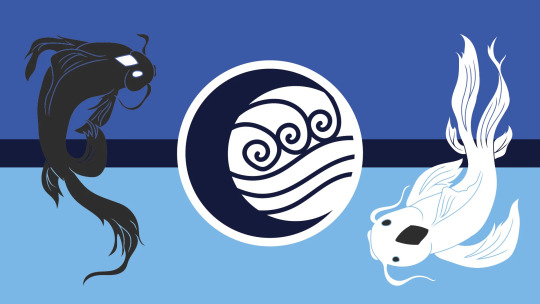
WATER TRIBES
Finally, water is the element of change. Like air, it adapts to its circumstances, but more fluidly and gracefully. Yet, unlike air, it relies on the flow of energy, turning its defense into an offense and back. In whatever scenario that sees fit, a Waterbender can change their liquid offense into a solid defense, or turn a solid offense into a gas defense.
This clearly makes the water an element suitable for either an offensive or defensive strategy. Its unique ability to change its form to fit its circumstances gives its user an extreme advantage in combat or any other risky scenario.
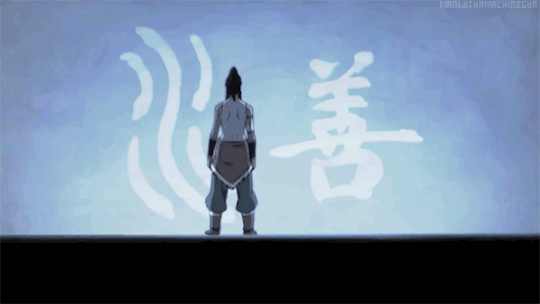
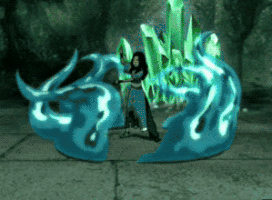
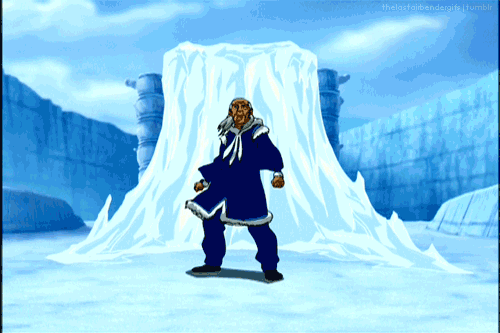
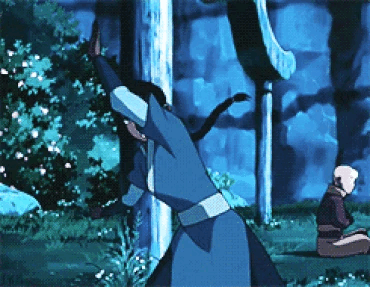
Now, even with this in mind, ironically enough, the people of the Water Tribe are not the most in sync with their element as far as when it comes to living standards.
While yes, in combat, they adapt and adjust accordingly to their needs and goals in the fight, in regular practice, they're more conservative and less open to change than you would initially believe.
Also, as confirmed in the LOK comics, while the Water Tribes are not openly homophobic, they are still lacking in accepting and embracing the concept that there is not one rule that applies to all when it comes to who they love. Which, when you think about it, checks out.
The Northern Tribe operated heavily off a patriarchal society as we saw in the first season, and it took Paku nearly getting his ass whooped by a teenage girl who was the grand-daughter of the woman he loved but refused to wed since it was arranged for them to start to change their ways. Even if the Southern Tribe was a bit ahead of their Northern counterpart in this sense, they still suffered from the restricting roles they placed on themselves concerning gender.
Giving props to Fire Nation and Air Nomads, they never had restrictive rules on who could fight in battle, even if the Nomads as mentioned tended to avoid conflict. However, the Earth Kingdom and Water Tribes both practiced and thus, were limited by their rules that men were only allowed to serve in the army and in the guard.
Of course, we've already discussed the Earth Kingdom is the slowest to accept change, but for the Water Tribes, this is a bit unnatural, and if this is how they act regarding gender, it says a lot about how they would react when it comes to same-sex relationships.
So, it's understandable why Kya advises Korra and Asami to keep their relationship to themselves. But, I personally don't believe they should. Creating change means people are going to be uncomfortable. Oh well, boo-hoo, they'll get over it.
But, this does at least check out with the hybrid offense/defense nature of water bending. People of the Water Tribe will stand their ground and defend what they choose to believe in and love. And while they may not openly go out of their way to push their beliefs onto others like those in the Fire Nation, it doesn't mean they don't still have ways have doing so. Like water, I imagine their approach to such a subject can vary.
With that, Water Tribes get a 2.5/10. They're ahead of the Earth Kingdom in the sense that they've realized excluding women from fighting hurts them more than it helps them. Also, it's highly plausible that if a woman can learn how to fight, a man can learn how to heal, but I digress. However, they're still lower than the Fire Nation since this is less of a government-forced ideology and more of a societal norm they place on themselves.
Acceptance Rating: 2.5/10
I like doing analysis like this. If anyone thinks of other topics to discuss and do a deep dive into, send it in my asks!
#solar-wing ☀️#☀️🪽.random#☀️🪽.avatarposts#☀️🪽.analysis#☀️🪽.txt#lesbian#gay#bisexual#transgender#lgbt#non binary#avatar the last airbender#legend of korra#atla#lok#water tribe#earth kingdom#fire nation#air nomads#male x male#female x female#mlm#wlw#bxb#gxg#fanfiction
79 notes
·
View notes
Text
genuinely the worst atla take i've seen since reading forums in 2008

#SHE IS A TWELVE YEAR OLD GIRL RAISED IN ISOLATION#ASSUMED TO BE INCOMPETENT DUE TO HER DISABILITY#WHO IS ATTEMPTING TO FIND A SENSE OF AGENCY IN LIFE BY BEING BOMBASTIC AND OUTRAGEOUS IN A WAY SHE WAS NEVER PREVIOUSLY PERMITTED!!!#HER WHOLE THING IS HATING THE RESTRICTIVE AND ARBITRARY RULES THAT DICTATE SOCIETY - SPECIFICALLY HIGH SOCIETY#you understand nothing and will die in ignorance#im not surprised someone with this little media literacy and character analysis skills thinks LOK was fine
160 notes
·
View notes
Text
I'm not mad at Katara for talking about how the fire nation killed her mother, I'm disappointed she doesn't learn her lesson.
EVERY SINGLE TIME she tells anyone about her mothers death, it blows back in her face or Sokka's.
Haru. Jet.. I'm sure there's more. But I'm very sleeby (I don't mean Haru, I meant Hama, autocorrect)
Jet tried to make her angry enough to destroy a whole village with little kids and innocent people in, he tried to manipulate her.
So fucking many people use that VERY PERSONAL INFORMATION to incite anger and hatred.
Need to say this first. I DO NOT SHIP ZUTARA
The only person not to use this information against her is Zuko. Even as the morally questionable boy he is, he doesn't use that information against her.
#avatar#katara#Aang#Zuko#Avatar analysis?#avatar aang#kataang#Haru#Jet#ATLA#avatar the last airbender#Lok#i am very sleeby and atla is my comfort show
74 notes
·
View notes
Note
“and suki’s bc i love sukka and i am deciding that they stayed together forever bc it’s my blog and i make the rules” being completely honest do you think they stayed together? like deep down? Im always split not because i dont believe they could last but more because Bryke would be like ‘yeah no they went their separate ways’ or whatever. I dont know !
honestly… this is a really difficult question lol
do i WANT them to be together forever and ever? yes of course. do i think they DID stay together? well….
as much as i absolutely adore sokka and adore suki and am obsessed with their relationship, i feel like it’s too unrealistic if kataang AND maiko AND sukka end up together. (this is assuming izumi’s mother is mai. just go w it for the sake of the argument).
the fact that we didn’t see anything of sukka’s potential children (or of sokka or suki themselves except one flashback) in LoK makes me feel like bryke didn’t really think about whether sokka and suki would stay together. or whether they were relevant to the plot of LoK (DUMB. btw. all they had to do was have asami or someone be like “yeah i trained with suki, leader of the kyoshi warriors” or have a scene of sokka w tenzin & tonraq defending baby korra against the red lotus. like cmon now. anything is better than nothing).
anyway back onto what i was saying i think it’s unrealistic for ALL of the teen couples to have stayed together for so long. kataang, fine, i guess, because they’re the main characters and most often things work out Good and Happy for the main characters. but i honestly feel like there was too much working against sokka for him to have the same romcom type fate idk.
no suki in the yakone flashback. no mention of ANY children (and you know that if they were together into their adulthoods it’s likely they would’ve had kids). that one scene in the fortuneteller episode where sokka is told he’s gonna have a life of self-inflicted misery (i forget the actual quote but yk which one i’m talking about). the fact that he and suki are in a long distance relationship throughout the comics… i just don’t know.
of course i WANT them to be together. i think that of all the couples in the original series they deserve it the most (not bias this time, i genuinely think they had the best chance of something real), but i also think bryke doesn’t rly care about sukka as much as i do.
do i think they stayed together? yes. one of my favourite things about sukka is their ability to find each other over and over again, even through long distance.
do i think bryke actively kept them together? probably not.
HOWEVER, *i* live in a state of delusion. so yes, sukka are together to me.
(also suki didn’t die young idek where that came from and the fact it’s still circling around is silly)
#ask#atla#lok#sokka#suki#sukka#ty for the ask anon#i don’t think i actually made a proper point here but. anyway.#there’ve been a lot of long posts recently#sorry#(not at all sorry)#anyway sukka i love you so much even if u guys break up i’ll still love u so mulch#MULCH?#*****MUCH 💀💀💀#analysis
17 notes
·
View notes
Text
I’m taking my shipper hat off for a moment to delve into an aspect of Kuvira’s personality that I would typically overlook since, admittedly, as common knowledge for anyone who has been following my blog for a while, I don’t care much for Kuvira’s and Bataar Jr.’s relationship beyond what pertains to the facts of her story. However, since I've been recently paying a closer look to her childhood by analyzing key moments of her upbringing that Ruins of the Empire provided, I think that the way those events shaped her personality may have led her to the choices we see her taking regarding her personal life. Given the parallels between Baatar Jr.'s parents and him and Kuvira, we can joke, saying that he might have chosen Kuvira as a romantic partner because of “mommy issues," but what about Kuvira? What if Kuvira's choice of Baatar as a partner reflects her own issues, specifically regarding her relationship with her father? Did Kuvira choose Junior to compensate for the absence of a caring and loving father? Kuvira’s insecurities have been discussed at length before, but I think this is an angle worth exploring, so let’s see if this notion holds any water.
So I wondered if Kuvira’s traumatic experiences with her biological father may have impacted the traits she wished for in a romantic partner and if Junior fulfilled those traits. Before getting into the specifics, you may notice that I’m avoiding the term “daddy issues” because, after a quick search, I found out that there is no such psychological term but rather what she might experience could fall under attachment disorder.
So back to the topic at hand, if Kuvira’s traumatic experiences primed her to seek a partner to compensate for the absence of a healthy relationship with her father, perhaps what Junior brought to the table coincided with what she sought. It would’ve been difficult for Kuvira not to appreciate the unwavering way (to a fault) that Junior supported and believed in her, in stark contrast to the total loss of confidence her father had in her, manifested in her abandonment. This abandonment led her to crave stability, loyalty, and trust, and we can assume Baatar Jr. supplied all of these things in abundance by the way he talked about her to others and through his behavior. She wanted someone who would support and believe in her, something he had done since they left Zaofu, when he defied his mother's wishes and de facto elected Kuvira over his family. Ironically, it was Kuvira at the warehouse who ended up doing what she feared and abandoned Baatar Jr. via spirit weapon blast for her goal of uniting the EK.
In Zaofu, despite having been taken in by Suyin and her husband Baatar Sr., Kuvira lacked proper parental figures to replace the ones she lost since she never felt truly part of the family. It’s not a stretch to believe she yearned to relive the experience of feeling she belonged to a family in the proper sense, even if it was an imperfect one. Bonding with Junior could’ve been the next best thing, especially during the formative years of their adolescence, when they began noticing what Suyin did and said more closely, leading them to analyze her ideology and her actions, realizing that her words and her actions didn’t necessarily align when it didn’t suit her interests. It cannot be a coincidence that of all of Suyin’s children, the ones who wound up ideologically radicalized in the household were Junior and Kuvira, and I have my own theory as to why this happened. As the eldest children, they were allowed access to the day-to-day ins and outs of administering the city and were entrusted with important positions within the administration. They were part of Zaofu’s circle of trusted people (this can explain how they knew and were connected to the influential people who left with them when they deserted Zaofu). Baatar Jr. worked closely with his father on everything related to the city’s infrastructure. Kuvira, as guard captain, was a key component of the security forces safeguarding the city from internal and external threats. As far as we know, none of their other siblings were involved in any capacity in running the city like they did, so they had a privileged view of Suyin, not only as their mother but also as the administrator and political leader of Zaofu.

I've posited before that either by conscious or unconscious choice, Kuvira emulated Suyin, and one of the ways she manifested this pattern was in the choice of Baatar Jr. as her romantic partner. He brought the built-in advantages of his knowledge and skills as an inventor and engineer to her grand plan, similar to Suyin and the skills that Baatar Sr. had, which allowed Zaofu to be the city Suyin envisioned. Kuvira wanted the same unwavering support Suyin had with her husband and also the ability to wield power without questioning as Su did, and Baatar Jr. provided this to Kuvira. This is not to say she didn't love him because I think she did, or at least she believed she did, since besides their bond growing up in Zaofu and developing similar ideologies, he provided the validation to counter the insecurity borne of her parental trauma, so it made it easier for her to develop feelings for him. She loved the way he validated her and her choices, and probably it was something she reciprocated since he had his own insecurities to deal with, so they became each other’s supporters, cheerleaders, and enablers. These aren't the things she might've actually needed from a partner, because we can assume that part of the unequivocal support he provided meant shielding her from accountability and from confronting her with the harsh truths of the dictatorship they led, something that in the end became a fatal flaw that affected both their relationship and their rule over the Earth Kingdom.
So, does this answer the original question? Kuvira’s trauma left an indelible mark on her psyche, so I think this could have predisposed her to seek and develop romantic feelings and attachment to someone who could make her feel validated and secure, and to me, Baatar Jr. fulfilled these needs for her. I’m not saying she didn’t have genuine romantic feelings towards him, but I do believe these factors weighed heavily on her choice because, for once in her life, she finally had someone who made her feel loved and cared for.
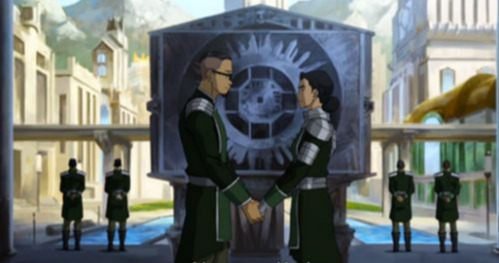
#the legend of korra#legend of korra#tlok#lok#kuvira#baatar jr#meta analysis#character analysis#baavira#don't get used to me writing about baavira tho
8 notes
·
View notes
Text
I think ASIT is about healing, and the way Pythas's story fits into that theme is why he's so compelling to me.
Pythas doesn't want to live after the Fire because he believes that his worth lies only in his ability to serve the machine, and now the machine is gone and he has no ability to serve it. He hates his disabled body because it means he's useless to the Order. The Order that no longer exists, anyway. He has never had a life outside of serving the Order, and now he can't, so what is there to live for?
This is why he joins the Directorate. He refuses to accept that the Order and the old Cardassia are really gone. If he can't offer his body to the cause, at least he still has his mind. I've always thought he was too cynical to believe that the Directorate was a good idea or would succeed, but his judgement is clouded by emotion. He doesn't want to believe that the Cardassia he dedicated his life to serving is really gone. He doesn't want to move forward, so he convinces himself it's possible and productive to go back.
I don't think he really sees a path forward, neither for himself nor for Cardassia. Pythas looks back and wishes he'd died, wishes Cardassia had been destroyed completely, because that would mean they wouldn't have to do the difficult work of healing. Healing is a long and painful road, but it's also the only way forward. It's inevitable. "The body wants to heal," says Kelas. Every minute of every day, the body heals, no matter how much you will it to stop. That's what Kelas helps Pythas see. You can stay suspended in the past, but the body will continue to march forward, towards healing.
I think what Pythas will learn, as he heals, is that there is a life beyond servitude, beyond obligation. He is more than what he's been beaten into. He has worth beyond his ability to follow orders, and there is value in a life lived for himself and the people he loves.
#back on my posting paragraphs of pythas analysis totally unprompted. who's excited#I'll never get over how asit is such a deeply hopeful story. there is immense grief but there is also healing. the body wants to heal......#andy............. mr. robinson.................#narcissus's echoes#pythasposting#asit#a stitch in time#pythas lok
12 notes
·
View notes
Text
I love headcanoning Lin with rough edges, even while she's healing and building healthy relationships post-canon. I love to see realistic growth with constant backslides. She's a certified grump and while, yes, she was wronged, she's also not blameless.
She held a grudge for thirty years, despite ample opportunities to hash things out. Her mom was distant and didn't give her the attention/approval she wanted. Her sister was a teenage brat who got caught up with the wrong crowd and made a big mistake. Neither are unforgivable crimes. In fact, those are pretty common sources of family drama.
Lin pushed everyone away for decades because she's stubborn as hell (affectionate) and refused to acknowledge her own flaws. She accused Suyin of being exactly the same as her teenage self (objectively false) because Lin herself wasn't willing to grow and bloom. She was just angry all the time. Maybe even angry at herself, deep down, for not even giving her family the chance to make amends.
What an amazing, complex character. I adore her. I love her rough edges and her unshakable sense of justice and her self-sacrificing nature. I love Toph and Suyin, too. Flawed people, tied to each other with invisible strings, pushing and pulling because they can't get on the same page. They're too different and too alike at the same time.
94 notes
·
View notes
Text
So, LoK has so many questionable messages around women in it. Zhu Li, Katara, Suyin and Pemma(?) are virtuous, patient, great nurturers. Nothing wrong with that, but I feel like their contrast with our "strong" women protagonists is...interesting in a bad way.
But Lin is a "bitter lonely woman" and naturally gets her ass handed to her by borderline tradwife mother-of-five Suyin. Plus the whole former love triangle (ugh) between her, Pemma and Tenzin. Hm.
Both Kya and Korra frequently get their asses handed to them and need saving, which. Korra is the Avatar. Even Asami can be less astute. And then there's Ginger the Hot Bitch who deserves to be kissed and constantly pursued without consent AND crazy girlfriend Esna(?).
Idk, it just feels...like casually sexist Nice Guys made this thing. Not horrible - I mostly like the show - but the unfortunate implications are there.
#LoK#was looking for analysis on Beifong sisters in S3 in particular and was surprised no one seemed to notice#Legend of Korra#men writing women#things that make you go hm
2 notes
·
View notes
Note
Ik you went into the whole stupid "nonbenders are oppressed" thing in lok in one of the asks I sent you, but it keeps on making me think about how much I wish i got to see mako and bolin's mixed earth kingdom fire nation heritage play a role in the story. Maybe if lok had the themes of atla it could go into how the two are treated differently for Mako looking more fire nation and bolin looking more earth kingdom. I think it'd be interesting if Korra keeps on hearing Amon's followers yell on the streets about how benders oppress everyone but then notice how Bolin gets treated significantly better when he pretends to be a non-bender fire national/lean into his fire nation heritage by ignoring his bending compared to when he is openly an earthbender which directly ties him to his earth kingdom heritage.
right!!! i am literally always saying this. like it’s sooo weird how lok does not understand what it means to be mixed in any meaningful capacity. neither with the kataangs nor with mako and bolin, they’re each just largely tied to the element they bend with no consideration given to the other half of their heritage. bumi doesn’t consider himself an air nomad until he magically gains airbending, despite his father literally being the only air nomad currently in existence. instead of trying to preserve his familial heritage, he completely undermines all of aang and katara’s cultural values and joins the fucking military. kya doesn’t seem to give a shit about air nomad culture either, seeing as she doesn’t even know guru laghima’s name (and he’s the wisest air nomad who ever lived!). despite apparently being an independent free spirit who values her freedom, she seems 100% affiliated with her mother’s heritage, because waterbender. even though the values of community and tradition kind of conflict with her whole “you can’t tie me down” attitude, so. um. and they never once explore how the value of, for example, hunting as an important cultural tradition in the water tribes may conflict with the value of vegetarianism and doing no harm to any living organism. these are interesting tensions that could have been explored!! but instead, tenzin is merely an air nomad who takes after his father both culturally and physically, kya is a waterbender who takes after her mother, and bumi is a…..cosmopolitan, and nobody likes him.
as for mako and bolin, they don’t even get the privilege of being the children of the avatar and the chief of the southern water tribe (i said what i said), so being mixed race in the neocolonial cesspit that is republic city would be bound to cause some tensions. but instead of actually addressing what the ramifications and complex colonial dynamics of inter/multiracial family structures in a postwar society that is nonetheless still struggling to contend with a century’s worth of global imperialism and the lingering trauma of that violence would be, they kind of just….ignore it. yes, mako is a firebender who takes after his fire nation mother, and bolin is an earthbender who takes after his earth kingdom father, and they live in a city that was once earth kingdom land that now functions as a neocolony of the fire nation, but also, the police force are all earthbenders, and there isn’t any sort of lingering racial/colonial tensions in this city whatsoever! you know how mako and bolin were orphaned as children and forced to live on the street and dumpster dive for food and eventually did labor for a gang because they had no other means of survival? are we going to question or implicate the systems that enabled those abject conditions? no, of course not. look at mako fumble two gorgeous, ridiculously privileged girls! look at bolin do the charleston! isn’t republic city FUN???
#bakedbeanchan#asks#lok crit#in the lok rewrite that lives in my head Children of Mixed Experience get the identity crises they DESERVE 😤😤#but yeah. what a mess#analysis#bumi ii#kya ii#tenzin#mako#bolin#bolin&mako
248 notes
·
View notes
Text
Ok, so because I was feeling a certain way today, I decided to try and approximate how many Avatars there have been throughout the Avatar cycle. It's really shoddy, but this is the best I can do.
WARNING: TERRIBLE MATH AHEAD!!!
So, I think it's confirmed that most Avatars live very long lives naturally, and indeed, the only ones we know of who died younger than 100 were killed and did not die of natural causes.
I don't think we know how old Wan was when he died, but he looked not quite elderly - given he was on the battlefield surrounded by arrows, he may have received a mortal injury, though honestly, it was a bit unclear. Anyways, we don't have enough information on his death to say for sure.
Kuruk died really young due to fighting off dark spirits which corrupted him. He was only 33, poor guy.
Roku died due to the volcano and was killed by pyroclastic flow which is... an awful way to go oh my god. He was 70.
Aang died at 66, but I believe it's confirmed that the 100 years in the iceberg took its toll on his lifespan, even though his body and mind were in suspension. So we can consider his full lifespan as 166 before he died peacefully.
Yangchen lived to 155 - we don't know how she died but since nothing was mentioned, it was probably old age.
So it seems most Avatars, if they are not killed, live to be well into their hundreds.
And finally, "average Avatar lives to be over 200" actually just statistical error. Avatar Kyoshi, who was 7 feet tall and lived to be 230 years old, is an outlier adn should not have been counted.
Ok, so I took an average with just Aang and Yangchen, and another that includes Kuruk and Kyoshi, as well as Roku, who did not die of natural causes. The final one excludes outliers Kuruk and Kyoshi, who we know canonically did not live as long/lived to be much older than anyone else.
First average: (166 + 155)/2 = 160.5 years
Second average: (33 + 70 + 166 + 155 + 230)/5 = 130.8 years
Third average: (70 + 166 + 155)/3 = 130.3 years
I find it unlikely that Kuruk and Roku were the only Avatars to be killed instead of die peacefully, so I think going with a lower average is the safer bet, though it seems that 150 to 170 might be the natural age limit of an Avatar who lives a full life. (We're working only with two Avatars though, so it's hard to say with any certainty.)
I'm using the third average because we know with certainty Kuruk and Kyoshi are far from the usual lifespan.
We know that Wan became the Avatar 10000 years before Korra. Wan's initial element was fire, so we know the number of Avatars we end up with must be a multiple of 4 (Fire -> Air -> Water -> Earth) minus 1 (Korra is a waterbender). Korra was 18 at the 10000 year point, I believe.
10000 - (155 Yangchen + 33 Kuruk + 230 Kyoshi + 70 Roku + 166 Aang + 18 Korra) = 9328
9328 / 130.3 = 71.5886 which is roughly 72.
72 is a multiple of four, which brings us to the last earthbender in the cycle before Yangchen. Going up to Kyoshi brings us to 76, plus three more to bring us up to Korra -> 79.
It seems likely that there were actually far fewer Avatars than we've imagined, unless a lot more of them died young.
In short, Roku. You said you mastered all four elements in "a thousand lifetimes" just to sound cool and intimidating, didn't you?
#why did i do this#storyrambles#atla#lok#if you would like to know approximately how many avatars there were. here you go.#call me ace detective the way i am ace. and also a detective.#<- yes i'm using my analysis tag even though this is objectively terrible. you cannot stop me.
4 notes
·
View notes
Text
How LOK Fails to Do Katara Justice (part II)
In part one of this meta, I explained how Katara's character received the worst treatment in Legend of Korra compared to the other members of the gaang, and the sexist writing of lok!Katara so that she is only defined by her relationships to her husband and children. In the second part of this analysis, I will explain how the common arguments that are used in defense of LOK's poor writing do not provide an adequate in-universe explanation for Katara's drastic change from ATLA.
Defense of lok!Katara seems to boil down to three main points:
1) The “leave it to the kids” excuse: Katara is from the previous generation so she shouldn’t be expected to be involved in the plot - it’s time for Korra’s team to have a turn.
2) The “old lady” excuse: Katara is too old to be fighting wars or getting involved in international politics.
3) The “people change” excuse: Katara’s character, personality, and goals would change over time because she’s older now.
I would be willing to accept these excuses under the condition that they are also applied to the other members of the gaang. Ignoring the fact that the Order of the White Lotus is literally a bunch of old guys fighting in wars in ATLA, if Toph and Zuko are also portrayed as too old to be fighting and leaving all their problems to the next generation to fix, along with Katara, it wouldn’t be as much of a problem. If Sokka, Aang, Toph, and Zuko are all portrayed as having different goals and motivations and characteristics than when they were younger, along with Katara, then again, it wouldn’t be as much of a problem. (It might be bad writing, but hey, at least it’s bad writing applied equally to every character).
The problem is that it’s only Katara’s character that takes a complete 180 from how it was set up in ATLA, it’s only Katara’s character that is too old to fight to defend her family, it’s only Katara’s character who leaves all her problems to the kids and stays completely uninvolved from the geopolitical conflicts brewing around her.
Returning to our original three excuses, let’s see how well they match with rest of the gaang’s portrayal in LOK:
1) “Leave it to the kids” excuse:
I will be leaving Sokka and Aang out of this since they are dead at the time of the show (though it should be noted that flashbacks show both of them being heavily involved in global leadership roles and managing political conflicts).
This excuse is not even close to applicable to Zuko. As soon as he finds out Zaheer has escaped from prison, he flies off on a dragon to check the other prisons. He warns Lin to look after Korra, but this doesn’t stop him from investigating with Tonraq on his own, without Korra and co's involvement. As soon as he hears his family may be in danger, he flies off on a dragon to protect them.
This excuse doesn’t apply to Toph. She does state that she agrees with Katara that it’s time to leave things to the kids, but her actions say differently. As soon as she finds out Suyin has been captured, she immediately attempts to find her - on her own, without consulting with the younger generation. When she realizes Suyin has been moved somewhere else, she works together with Korra and co to save her family - twice actually. She also involves herself in Korra’s life by helping her train and recover from her PTSD.
Meanwhile, Katara does nothing when her home is dragged into a civil war, does nothing when her family is kidnapped, and does nothing when a bloodbender is using his abilities to oppress others (despite being the one to outlaw bloodbending).
2) “Old lady” excuse:
Again, also not applicable to Aang and Sokka because they’re dead at the start of the show.
This excuse does not apply to Zuko whatsoever. He never mentions that being old prevents him from fighting or getting involved in the political conflicts that arise. He has no problem fighting Ghazan during the Red Lotus prison break-in and has no problem riding his dragon. He stays involved in international relations despite being “retired” from his position as Fire Lord - helping to track down the Red Lotus, attending important international events, and holding meetings with leaders of other nations (Tenzin, Raiko, Tonraq).
Toph tells Korra that her fighting days are over due to having back problems, but has no problem fighting Korra during training and easily takes out Kuvira’s army.
Katara never fights during the entire show. And as far as I can remember, she never waterbends at all beyond healing on a few occasions.
I feel like it’s important to note that both excuses 1 and 2 are never even mentioned in regard to Zuko (or the Order of the White Lotus) - it’s only Toph and Katara that seem to be “too old” to fight and have to leave everything to the kids. Toph’s actions don’t align with her words, unlike Katara, but it doesn’t change the fact that these excuses are unequally applied to old women in Legend of Korra compared to the old men in Legend of Korra (and ATLA). Good old misogyny at work!
3) “People change” excuse:
Sokka: Begins his story in ATLA as son of the Chief of the Southern Water Tribe, desperately trying to fill his father's shoes when Hakoda goes off to war. He becomes the defacto leader of the gaang over time due to his fondness for schedules, his leadership abilities, and analytical thinking skills. Despite being a nonbender, he held his own with his trusty boomerang and strategic thinking. Ends his story in LOK having taken over from his father as Chief of the Southern Water Tribe, putting those leadership skills to use. His intelligence and strategic thinking made him an ideal candidate to be a Representative for the Southern Water Tribe on the Republic City Council, as he could be trusted to make smart decisions that were the best for his tribe. He was even elected chairman of the council due to these skills. A statue was built in his honor, which included his favorite boomerang.
Zuko: Begins his story in ATLA learning to heal from his father’s abuse and, in the process, slowly comes to understand the evils of Fire Nation imperialism. He replaces his father as Fire Lord and vows to start a new era of peace and harmony, ending the war and the Fire Nation’s colonialism and imperialism. He also vowed to work together with the Avatar to maintain balance. Ends his story in LOK having achieved peace and prosperity in the Fire Nation again. Turned previous Fire Nation colonies into the United Republic of Nations - meant to be a safe haven for anyone, regardless of nationality or bender status - by working together with Aang. Fights against the Red Lotus to protect Avatar Korra and his family. His statue, in contrast to Ozai’s former statue, is one representing peace and hope.
Toph: Begins her story in ATLA rebelling against her strict parents, who are overprotective of her due to her blindness. She learns to rely on and trust others over the course of the series, realizing that accepting help from others doesn’t mean she’s weak. She enjoyed pulling scams on naive civilians in the show using her earthbending seismic abilities and participated in the Earth Rumble in her youth. She also invented metalbending and worked as Aang’s earthbending teacher. Ends her story in LOK having created a metalbending academy to teach others the bending speciality, along with establishing the first metalbending police force. Metalbending is shown as having made significant contributions to technological innovation and progress in the avatar world. Helped to train Korra while she’s recovering from the her capture by the Red Lotus. Though she liked breaking the rules when she was younger, she found it more fun to be the person in charge of the rules - leading her to become Captain of the Police Force. Still suffering the consequences of poor parenting as a child, she became an overly-lenient parent, leading to problems with her daughters. She states that her fighting days are over, but still seems to enjoy fighting Korra.
(As a side note: I do not agree with how the writers chose to take Toph’s story. Do I think they should have - and realistically, could have - gone in a different direction that did more justice to Toph’s character? Yes. However, I also see how it could potentially be possible that she became a cop and uninvolved parent based on her background. I don’t like it, but I can at least see some logic behind her storyline - unlike Katara’s. If anyone feels differently, I'd love to know your thoughts.)
Aang: Begins his story in ATLA learning to become the Avatar by mastering all four elements, mastering the Avatar State, and acting as a bridge between the human world and Spirit World. Struggles with being the sole survivor of the Air Nomads and attempting to keep his culture alive. Works to keep balance in the world among the four nations by defeating the imperial Fire Nation. Ends his story in LOK having achieved his goals as Avatar, successfully keeping peace amongst the four nations and establishing the United Republic of Nations as a sanctuary for all, no matter nationality or bender status. Considered a spiritual leader and successfully kept peace between the spirit world and human world. Had an airbender child and airbender grandkids, traveled the world to spread his culture, including building a temple on Air Temple Island in the United Republic, and other characters repeatedly state that for his entire life, his dream was to revive Air Nomad culture.
Katara: Begins her story in ATLA trying to master her waterbending abilities, trying to teach herself on their journey. Views waterbending as a way to connect with her culture. She challenges the Northern Water Tribe’s sexism for the right to learn how to fight. Famously declares, “I don’t want to heal, I want to fight!” Passionate about standing up against injustice - causes a prison riot through an inspiring speech she gives, dresses up as a Fire Nation spirit to heal sick villagers, and goes after her mother’s killer. She is forced to bloodbend, a traumatic experience for her. Teaches Aang how to waterbend and is eventually bestowed the title of “master waterbender” by Pakku. Occasionally heals others when they get injured, but main focus is on development of her waterbending fighting abilities. Ends her story in LOK known as the best healer in the world, but fails to heal Korra and Jinora. Spends her time during the civil war on the sidelines, healing the injured. Marries and has kids with Aang. She’s lonely and her family doesn’t visit much. No known achievements beyond outlawing bloodbending (which she is somehow able to do without holding any political titles beyond that of the Avatar’s wife).
Hopefully it should be clear that Sokka, Aang, Toph, and Zuko's characteristics, goals, and motivations don't change as drastically as Katara's do. The writing of Katara in LOK did a disservice to her character. I've always deeply admired Katara for never failing to stand up against injustice, for her empathy and kindness even for those who are different from her, and for her determination not to let patriarchal norms define what she can and can't do. While LOK's portrayal of other characters provides a glimpse at how their character arcs in atla influenced the way they shaped the world, we never get a glimpse of the original Katara - only a lackluster imitation of someone with the same name.
If the Avatar franchise continues to expand with more post-ATLA content of the gaang as adults, I certainly hope Katara's characterization is improved.
#katara#katara analysis#atla#zutara#anti lok#lok critical#once again not shipping related only tagging zutara for visibility#my post#my meta
193 notes
·
View notes